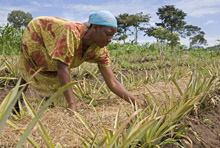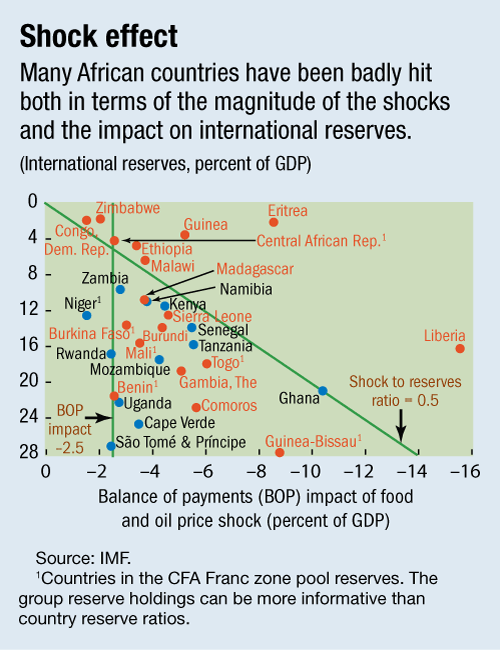
Typical street scene in Santa Ana, El Salvador. (Photo: iStock)
IMF Survey: Commodity Price Spiral Taking Toll on African Economies
July 1, 2008
- Eighteen countries especially hard hit
- Combined shocks sharply raising import bill of many states
- Additional financing can play a critical role
Many African countries are among the hardest-hit by the world food and fuel price crisis.

Additional budgetary expenditures may be called for to promote development of domestic agriculture, IMF analysis says (photo: Andy Aitchison/Corbis)
TWIN SHOCKS FOR SUB-SAHARAN AFRICA
High food prices in particular tend to hit the poor the hardest—food generally represents a very large share of their expenditures—and thus put at risk progress on poverty reduction, social cohesion, and the broader development agenda.
Fuel price increases have a variety of damaging effects, including by raising the cost of agricultural production and thus, in turn, aggravating the food crisis. The two shocks together raise sharply the overall import bill in many countries, threatening to derail macroeconomic stability, growth, and efforts to reach the Millennium Development Goals (MDGs).
The IMF's African Department has produced an analysis of the implications of the price shocks for the balance of payments of low-income countries in sub-Saharan Africa. The note identifies a list of 18 countries in the region that are especially hard hit and that, consequently, face a pressing need for additional balance of payments and budget support. The list reflects country circumstances and underlying assumptions as of May 2008, and is subject to change; it is not meant to be definitive.
Unavoidable pass-through
High food and fuel prices are likely to persist. Pass-through to higher domestic prices, though not necessarily immediate, is therefore ultimately unavoidable. More broadly, monetary, fiscal and other policies will have to adjust. In some cases, the exchange rate can play an important role. Additional financing can play two critical roles in this context.
• In the short term, additional external support to meet higher import bills can give countries time to phase in the necessary adjustments, thereby easing their economic impact and reducing social pressures. Such support may also make it feasible for some countries to run temporarily larger fiscal deficits to cover targeted budgetary assistance to the poorest segments of the population.
• Looking to the longer term, additional budgetary expenditures may be called for to promote the development of domestic agriculture and to put in place sustainable social safety nets. While these expenditures may be met in part through higher domestic revenues or reductions in other spending, additional concessional financing will also have a role to play. The terms of such financing will need to take into account individual countries' debt situations; for most countries, it should be wholly or predominantly on grant terms.
Need for additional financing
The IMF analysis seeks to identify those countries that may face the most pressing near-term need for additional concessional financing. The balance of payments impact of the food and fuel price shocks is large on average, but their incidence is highly country specific, depending on the patterns of trade as well as initial conditions.
There are a couple of caveats: Although there is merit in focusing attention on the hardest hit, the list is not meant to be definitive. First, there is a degree of arbitrariness in the cutoffs used to place countries on the list. Countries below the cutoffs in many cases have substantial and urgent needs. Second, the list reflects price assumptions and country-specific circumstances in May 2008; as the outlook changes, so too will the impact on individual countries.
The list comprises countries for which the trade balance impact of the 2008 food and fuel price increases exceed one of two thresholds (see chart):
• Either, 50 percent of initial international reserves: Eritrea, Ethiopia, Guinea, Liberia, Madagascar, Malawi, the Democratic Republic of Congo, and Zimbabwe
• Or, 2.5 percent of GDP: this threshold is applied to the West African Economic and Monetary Union and the Economic and Monetary Community of Central Africa currency zones (for which the reserves-based indicator is less meaningful): Benin, Burkina Faso, Central African Republic, Guinea Bissau, Mali and Togo; and to states with particularly weak initial institutional frameworks: Burundi, Comoros, the Gambia, and Sierra Leone.
For Madagascar, the cost of reconstruction due to natural disasters (cyclones) is also a factor. The estimates for Zimbabwe are highly uncertain, owing to data problems. The list excludes Senegal, which meets the second criterion, on account of other influences on the balance of payments.
Attached to the note are one-page country briefs providing context and background on the situation in each of the 18 included countries. As these briefs suggest, country experiences differ widely. As examples:
• In the Central African Republic, both food and oil price rises weaken the balance of payments. To help address the higher import bill—about 2.5 percent of GDP—the current IMF-supported program was augmented in June.
• In Malawi, the negative impact is mainly due to the oil shock as well as higher fertilizer prices. The magnitude of the shock is about 4 percent of GDP, more than half of international reserves.

Comments on this article should be sent to imfsurvey@imf.org


